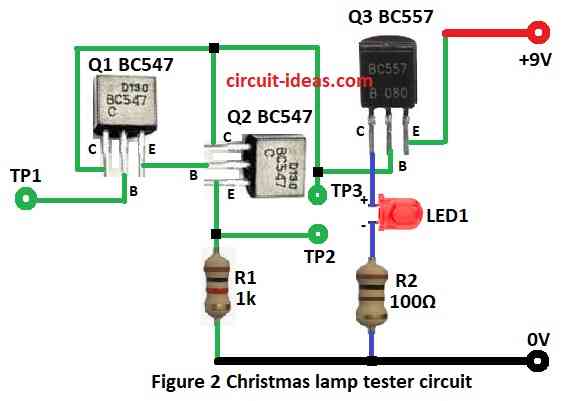Christmas come one time in a year and it brings big joy.
Simple Christmas Series Lights Tester Circuit is simple design.
It checks and fixes problem in series Christmas lights.
These lights are used for holiday decorate.
If one bulb stops then all lights go OFF.
One bad bulb break the whole circuit and makes the string dark.
Below is the circuit diagram that show how it work and how to make it.
Circuit Working:

Circuit is simple to make which is shown above.
It help to find bad bulb fast by no need to remove all bulbs or do hard work.
This tool is useful for the whole year which test the fuse, lamp, wire and more.
Wire like Christmas light makes electric field when plugged in, even when there is no power flow.
Field is still there if the wire is broken.
This circuit find where break is.
In fig 1 lights connect to power and breaks at point X with bulb bad or loose.
From live terminal, the field is at A, B, C… till X.
At X there is no field that show problem spot.
Then just check the bulb clean it or push it in.
If many bulbs are bad then first one show first.
Fix it and then find next one easily.
But small problem like wires in light are not set spaced same.
Neutral wire wrap around live wire which is hard to test one alone.
If plug in right way then live wire makes field.
Neutral wire is close to ground with weak field.
Tester mostly feels the live wire.
If neutral wire break means the rare, then its is still light or socket problem.
If there is break at point X then wires on left show field and right side show nothing which means neutral.
But if plug is reversed from L to N then N to L field is all over wire.
Even with break the tester sees the full field.
Both wires usually green which are hard to know which is live.
If light is not working but field is everywhere then flip plug or rewire it.
Detecting electric fields:

Parts List:
| Component | Specification | Quantity |
|---|---|---|
| Resistors | 1k 1/4 watt | 1 |
| 100Ω 1/4 watt | 1 | |
| Semiconductors | Transistor BC547 | 2 |
| Transistor BC557 | 1 | |
| LED any 5mm 20mA | 1 |
Electric field can be found by using metal wire or plate as probe.
Probe in field gets same voltage as field at that spot.
If voltage is AC then field can also change back and forth.
But it is hard to show this with normal tools.
If we use normal voltmeter with probe and ground with no reading then meter gets overloaded.
To fix this we need high input impedance buffer or amplifier to show the result.
This circuit uses strong amplifier with high input impedance.
With only 3 transistors, 2 resistors and 1 LED see the fig 2.
First two transistors make Darlington pair and this gives big current gain to about 10,000.
Input impedance is about 10 megohms.
Current then goes to PNP transistor which turns ON the LED.
Want sound too? then we can add piezo buzzer.
Circuit works with voltage as low as 3V.
Use 9V battery or two 1.5V AAA cells.
But with low voltage the buzzer sound is weak.
Power use is very small so no ON/OFF switch is needed and through this the battery lasts very long.
Formulas:
Simple Christmas Lights Tester with easy formulas
Voltage at TP2 (Voltage Divider):
R1 1k and base-emitter of Q2 BC547 make voltage divider.
Voltage at TP2:
VTP2 = VTP1 − VBE
where:
- VTP1 is the voltage from lamp terminal
- VBE is the base-emitter voltage of Q2 is 0.7V
LED Current ILED:
Current through LED depends on resistor R2 100Ω and voltage drop:
ILED = (VTP3 − VLED) / R2
where:
- VTP3 is the voltage at TP3
- VLED is LED forward voltage for 2V
Transistor Saturation:
To make Q1, Q2, Q3 go into saturation:
IB = IC / β
where:
- IB is the base current
- IC is the collector current like LED or R2 current
- β is the gain of transistor with 100 to 300 for BC547/BC557
How to Build:
To build a Simple Christmas Series Lights Tester Circuit following are the steps to follow:
- Gather all parts as per fig 2 circuit diagram.
- Connect base of Q1 to TP1 tester.
- Connect collector of Q1 to collector of Q2.
- Connect emitter of Q1 to base of Q2.
- Connect base of Q2 to emitter of Q1 which is the Darlington pair
- Connect collectors of Q1 & Q2 to base of Q3.
- Connect emitter of Q2 to GND through R1 resistor.
- Connect collector of Q3 to GND through LED1 and R2.
- Connect emitter of Q3 to +9V supply.
- TP2 tester goes between emitter of Q2 and R2.
- TP3 tester connects to base of Q3.
Safety Precautions:
- Be sure the tester works with AC or DC type light string.
- Unplug light string from wall before testing and avoid electric shock.
Conclusion:
Simple Christmas Series Lights Tester Circuit is helpful tool.
It finds bad bulbs or broken wires in series light strings.
It helps us fix lights fast while decorating.
This circuit uses low voltage which is safe to use while getting ready for holidays.
Leave a Reply